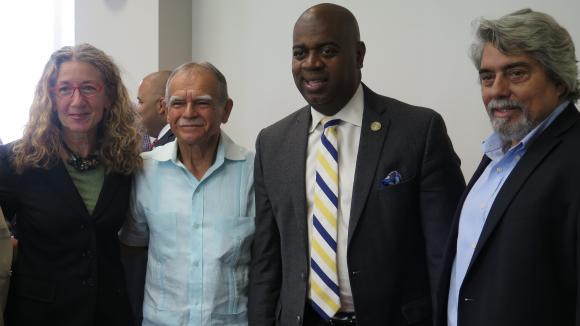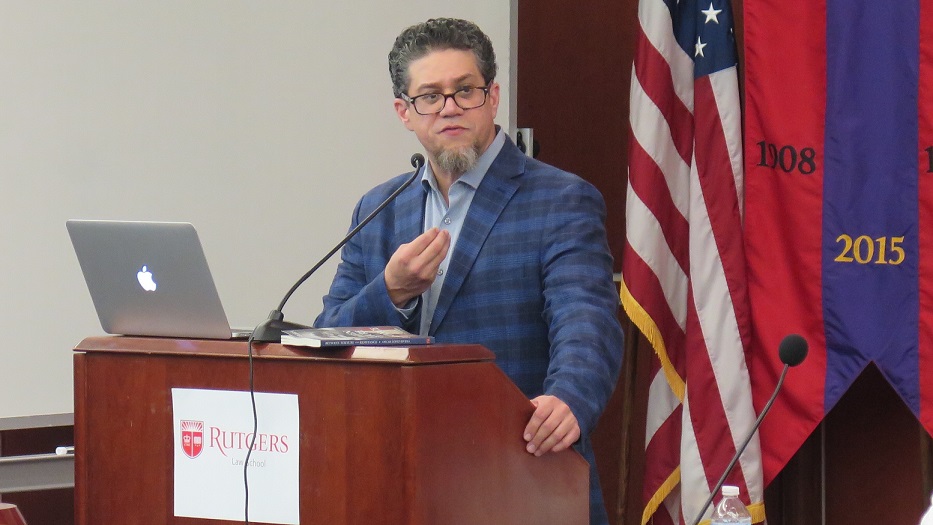
From left to right, Attorney Janis Susler, Oscar Lopez Rivera, Newark Mayor Ras Baraka and Professor Charles Auffant.
After 35 years in prison and four months on home confinement, Puerto Rican nationalist Oscar Lopez Rivera spoke at Rutgers Law School about the plight of political prisoners and his journey from serving as a soldier in Vietnam to becoming a prisoner of the United States Government.
He said that Puerto Ricans had a right to self-determination and would never be economically independent as long as they remained a United States territory. He cited statistics of medical students, law students, university students and college-educated teachers leaving the impoverished island to find jobs in the United States.
“Puerto Rico is suffering the biggest economic crisis in its history since the Great Depression,” he said. “We have lost a human resource, educated people are leaving because there are no jobs for them.”
Rivera was born in Puerto Rico, which is an unincorporated U.S. territory, but raised in Chicago. Rivera said he felt the American Dream was within his grasp when he was drafted and served in the Vietnam War. Speaking of his return from the war in 1967 he said, “I came back from Vietnam a changed person.” Inspired by others who had come out publicly against the Vietnam War, such as Dr. Martin Luther King Jr., he said he decided to fight against colonialism, including the colonialism in Puerto Rico.
Rivera became part of a Puerto Rican liberation group in the 1970s called Fuerzas Armadas de Liberación Nacional Puertorriqueña, or (FALN). The group was accused of bombings, including one that killed four people. Rivera was arrested and accused of being a bomb-maker and recruiter for the group. He was tried during 1980-81 and sentenced to 55 years in prison. Throughout his sentence he has maintained he was a political prisoner and disavowed personal involvement in bombing deaths linked to the group.
Rivera’s attorney, Janis Susler, who works on behalf of political prisoners, said activists in the late 1960s and 1970s who advocated for Puerto Rican independence were criminalized and arrested. Once Rivera was arrested, he was denied medical care, phone calls, and held in solitary confinement for 12 years. He was never convicted of hurting or killing anyone, she said. “They were punished because of who they were politically.”
Rivera’s sentence was commuted by President Barack Obama, days before Obama left office, but had been supported by several religious leaders, Nobel Peace Prize winners and former President Jimmy Carter.
Rivera’s talk at the law school drew a surprise visit from Newark Mayor Ras Baraka, who said his parents, poets and activists Amiri and Amina Baraka, took him to hear Puerto Rican nationalists speak when he was a boy. The mayor welcomed Rivera and said that political prisoners were often jailed in the 1970s for talking about topics that many people discussed openly in their homes.
Professor Jason Cortes gave an overview of the history of Puerto Rico.
Rivera was introduced by Professor Jason Cortes, Director of the American Studies Program at Rutgers University-Newark, who gave a brief history of Puerto Rico and its independence movement, explaining the legacy of colonization on the island, first by the Spaniards and by the United States. That legacy of colonization has left the financial power and decision-making in the hands of the U.S., not the Puerto Ricans, he said. In 2017, Cortes said 46 percent of the people live below the poverty line, unemployment is 12 percent – twice that of the United States, and that the minimum wage for people under the age of 24 is $4.25 an hour.
Rivera’s visit to Rutgers was sponsored by the university’s American Studies Program, Association of Latin American Law Students, Latin Studies Working Group, National Lawyers Guild. the Community and Transactional Lawyering Clinic at Rutgers Law School, and the International Human Rights Clinic.
Now 74, Rivera maintained, “Any nation has the right to fight against colonialism.” But the former revolutionary has softened his stance, “I have a message for Puerto Rico: We don’t need force.” He said he still believes it is important to decolonize Puerto Rico and to “invite the rest of the world to work with us.”
